The Mad Men finale: Don Draper goes out with an “Om” and we fade to a Coke ad. Where is Walter White when we need him?
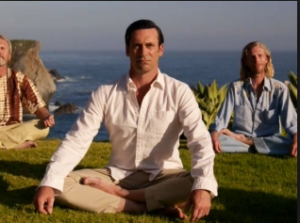 By Peter Lance © May 19, 2015 New Yorker critic Emily Nussbaum called the ending of Sunday night’s Mad Men finale “existentially brilliant.” But as a devoted fan who binge-watched the first 6 seasons just before the final 7 episode run, I felt as if I’d just downed a 16 oz. bottle of Coca-Cola.
By Peter Lance © May 19, 2015 New Yorker critic Emily Nussbaum called the ending of Sunday night’s Mad Men finale “existentially brilliant.” But as a devoted fan who binge-watched the first 6 seasons just before the final 7 episode run, I felt as if I’d just downed a 16 oz. bottle of Coca-Cola.
I also came away thinking that Matthew Weiner, the series creator who wrote and helmed the last hour, finally got his revenge on Lionsgate. After he’d won four back-to-back Emmys, the production company put the series on ice for a year while they forced him to squirm through contract negotiations.
Weiner finally settled in 2011 with a three-season contract worth $30 million but he told The Hollywood Reporter that, “Being off the air that long was bad for us. I felt that the show’s prestige was damaged.”
And there’s little doubt that in terms of popularity, awards and critical acclaim Mad Men was quickly eclipsed by AMC’s other iconic series Breaking Bad.
Given the true (non-existential) brilliance that Vince Gilligan demonstrated in tying the threads of Walter White’s life into a violent, action packed tapestry, every Mad Men fan had the right to expect something approaching closure from Weiner.
Instead he literally devoted one third of a 45 page script to the end of Don’s cross-country odyssey at Esalen Institute. It included one interminable four and a half minute soliloquy by a first-time peripheral character that played out like slow-dripping sap.
I actually expected Weiner to fulfill the promise of his tease in Episode 12 when Don taps on the window of his new office at McCann Erickson, as if to test its tensile strength. How auteur would it have been if he then returned to Manhattan for a real-life out-the-window take on the animated open?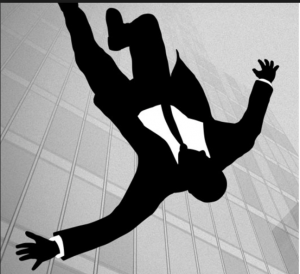
But that would have required Don to understand that the biggest vow he’d broken in his runaway life was to the public – to the millions of consumers whose lives would be shortened or abruptly ended by the many products he so slickly packaged.
And since Weiner is the God of all this, that would have meant an admission on his part that he’d built his gorgeous 92-episode house on a moral Superfund site and that the ring-a-ding lifestyle of the Martini swilling, two-pack-a-day Luckys smoker embodied in Don Draper was not such a pretty thing.
Except for a couple of peripheral characters like Abe Drexler, Peggy’s ex-boyfriend and the conscience of the Sixties who ranted about corporate greed, virtually every principal character in the series would roll their eyes at any hint that what they were selling caused cancer or killed (back then in the pre-seatbelt/airbag days) nearly as many drivers in a single year as all of the U.S. troops who died in Indochina.
And Vietnam itself, like most of the historic events bookmarked in the series like the JFK assassination and the late 60’s race riots was treated pretty much as an off-screen annoyance. It was Joan’s problem when her doctor-husband abandoned her for the war.
Dow Chemical, the company that defoliated much of Vietnam and condemned thousands of American GI’s to a painful death from exposure to Agent Orange, was treated as a prize to be courted and won.
Even as late as the finale, Joan got rescued when Ken Cosgrove tossed her an in-house documentary contract that Peggy would also get rich from. The prospect of helping Nixon grab the White House, servicing Dow or “keeping” the Lucky Strike account were Sterling-Cooper challenges that millions of viewers found themselves rooting for.
In the end when Weiner could have paid off Don’s on-again/off-again ad man flirtation with a chalk outline amid broken glass on Madison Avenue, we got him going out in Lotus position chanting “Om,” as the music faded up for Coca-Cola’s legendary “Hilltop” commercial.
If you’re over 40 you remember that one. It featured lines of slim, happy, racially diverse young men and women in native dress holding bottles of “The Real Thing” and promising to “teach the world to sing in perfect harmony.”
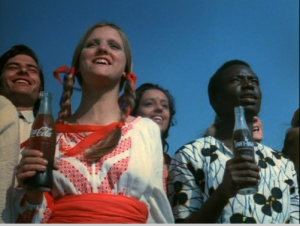 It was hard to escape Weiner’s clear suggestion that Don, now having reached a state of enlightenment, was on his way back to Manhattan to conceive that spot and maybe pick up another CLIO. He even dressed the actress who played the concierge at Esalen in a way that mimicked one of the young women in the ad who wore braids and a red and white peasant shirt.
It was hard to escape Weiner’s clear suggestion that Don, now having reached a state of enlightenment, was on his way back to Manhattan to conceive that spot and maybe pick up another CLIO. He even dressed the actress who played the concierge at Esalen in a way that mimicked one of the young women in the ad who wore braids and a red and white peasant shirt.
CRITICISM IS EASY – WRITING IN HARD
As an investigative reporter who also writes fiction, I fully appreciate the genius that went into the 92 hours of Mad Men. It was a series that broke new ground in cable with some of the finest writing and acting in television history.
I occasionally get hit by trash one-star book reviews on amazon.com, so in my own small way I know how easy it is for someone to write a shoot-from-the-hip critique and how hard it is to fill the blank page as Matthew Weiner did year after year.
But Stephanie, the attractive/whiney niece of the woman Dick married to legitimize his transition to Don, complained in the last episode that she felt everyone was judging her so Weiner, who wrote those lines, has to expect a few lumps.
Television is an amazingly powerful force and I witnessed first-hand the beginning of the end of the great network news divisions. Having reported in the halcyon days of ABC News during the 1980’s it’s difficult for me to watch a glamour boy with a paper-thin resumé like David Muir sitting in the chair once occupied by Peter Jennings or a conflator and talk show host wannabe like Brian Williams as the heir to Chet Huntley and David Brinkley on NBC. At least with Scott Pelley The Eye Network has a real reporter as the anchor of The CBS Evening News.
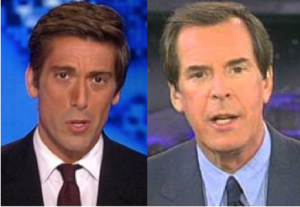
Still, the once hard-hitting news mags like Dateline, 48 Hours and my own alma mater 20/20 have morphed into little more than “true crime” skiens. They celebrate forensics. The documentary equivalent of CSI, NCIS and their crime scene progeny. Try and get the news from CNN on a weekend night and you’ll get The Forensic Files.
Like Coca-Cola, those “news” magazines are tasty but they have zero nutritional value and high caloric content. You down enough of “The Real Thing” and you don’t end up on a hilltop singing in a size two sahri or dashiki, you end up obese.
What does it say about the state of television when for years the best journalism on the small screen came from Jon Stewart and now it’s being practiced by Anthony Bourdain and VICE? Given all that, one has to mourn the loss of any missed opportunity for TV to challenge viewers and expose hypocrisy.
WHAT WEINER COULD HAVE DONE
It was absolutely possible for Matthew Weiner to entertain us while using his sleekly designed bully pulpit to teach us important lessons. But he didn’t.
He left young women who might aspire to corporate leadership thinking that maybe Joan and Peggy telling lies for a chemical company was a great career move.
His solution for a happy reboot to Pete’s broken marriage was to fly his family off in a Lear Jet. Our last shot of Betty dying of lung cancer was with a butt in her hand; brassing it out as her children watched her. Some life lesson that was.
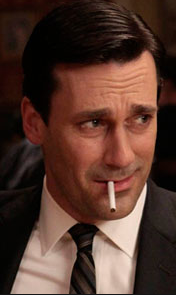 And what about Don, the series’ central protagonist? We’re led to believe that he underwent a quick moral scrub overlooking Big Sur before returning to his job as a merchant of deceit.
And what about Don, the series’ central protagonist? We’re led to believe that he underwent a quick moral scrub overlooking Big Sur before returning to his job as a merchant of deceit.
The pilot began with him making cocktail napkin notes so he could “pitch” Lucky – later coming up with that clever diversion, “It’s toasted.” And though he later denounced that move in his infamous letter to the NYT, Don had a packet of cigs in the breast pocket of his green polo shirt in the final moments of the series at Esalen. And that was after he’d learned that the mother of his children was terminal.
One of the truest expressions of a life lived is that “It doesn’t matter where you start out, it’s where you finish that counts.”
Now consider Don: He hijacked another man’s identity in war. He blew through two marriages and went through the 60’s and 70’s womanizing and plastered while still looking great in a suit. And what did he learn from all of this? What was his “character arc,” as they love to say in network development meetings?
Weiner leaves us believing that as always, Don will just take a nap, shower, shave, light up an un-filtered cigarette, pour himself another single malt and be back on ad row telling beautiful lies.
If there is something brilliant about all of that, I missed it.



Recent Comments